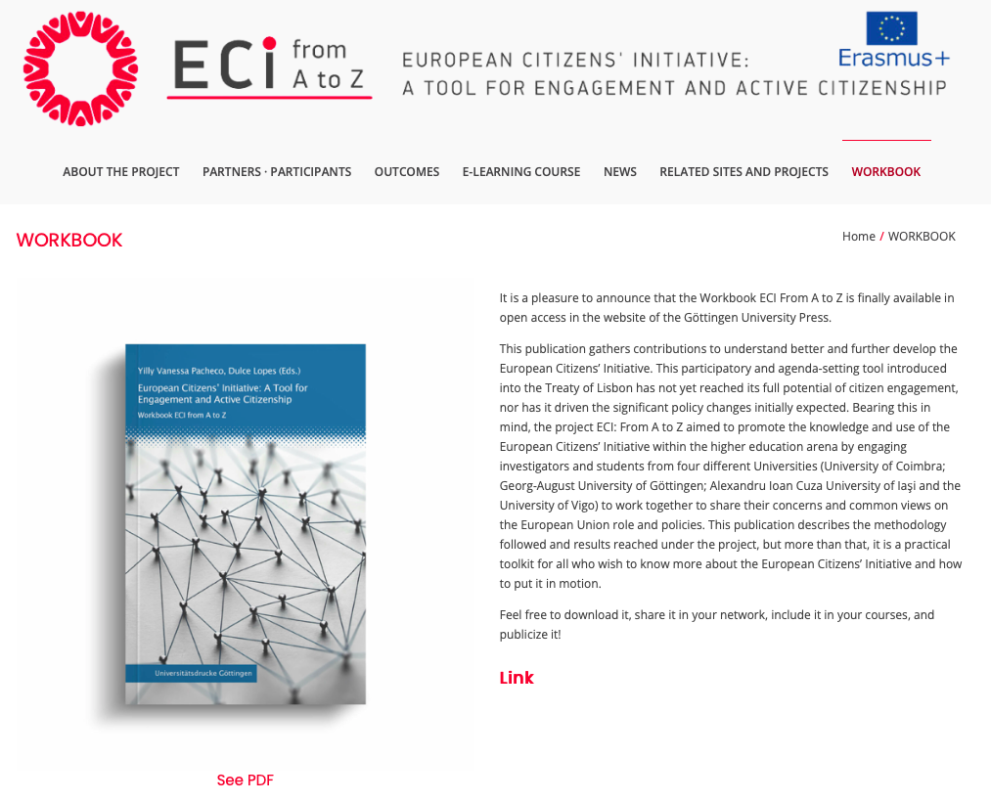
The Workbook ‘European Citizens’ Initiative: A Tool for Engagement and Active Citizenship’ (in short: Workbook ECI from A to Z) compiles theoretical and practical contributions of academics and researchers, ECI organizers and invited experts and serves as a practical toolkit for all who wish to know more about the European Citizens’ Initiative (ECI) and how to put it in motion.
The workbook is one of the main outputs of an Erasmus+ Project which aimed to familiarise higher education students with the mechanism of the ECI, namely by providing them with the competences to develop their own proposals and, therefore, become active agents in EU policy and decision-making processes. The Workbook was edited by Yilly Vanessa Pacheco (University of Göttingen, Germany) and Dulce Lopes (University of Coimbra, Portugal), and published by the Universitätsverlag Göttingen.
The Workbook is available for free download here. Summaries are also available in Portuguese, Spanish, German, Romanian and French.
The Workbook is divided in two parts: the first one addresses “the European Citizens’ Initiative in detail” and the second is fully dedicated to the “Project European Citizens’ Initiative from A to Z”. In total, this publication gathers contributions from almost three dozen authors: 19 researchers of the Project (from the University of Coimbra in Portugal, the Georg-August University of Göttingen in Germany, the Alexandru Ioan Cuza University of Iaşi in Romania, and the University of Vigo in Spain) and 9 external contributors (Ángel Fernández Silva, Salamanca University; Anastasia Karatzia, Essex Law School; Olga Kikou, End the Cage Age; Elisa Lironi, ECAS; Carmen Montesinos Padilla, Complutense University of Madrid; Graça Múrias, Portuguese Contact Point ECI; Regina Quelhas Lima, Portuguese Contact Point ECI; Vasiliki Mustakis, ECAS; and Hendrik Nahr, make.org).
Participants at the final dissemination event of the ECI From A to Z Project, Univeristy of Coimbra
Part I of the Workbook is divided into five sections. The first one is dedicated to the constitutional framework of the ECI, with a couple of important contributions concerning European citizenship, democracy and citizens’ participation. The second section aims to answer the question “what is an ECI for?”, stressing the importance of the role played by this mechanism in empowering citizens to take an active part in the future of the European Union, therefore contributing to the reduction of its ‘democratic deficit’ and increasing its political legitimacy. In turn, the third and fourth sections address the questions of the object and the subjects of an ECI. Particular attention is paid to the mission of the European Citizen Action Service (ECAS) and how this organization provides support to citizens in order to create a more inclusive and stronger European Union, namely through the ECI Forum which is operated by ECAS on behalf and under contract to the European Commission. Last but not least, the fifth section seeks to explain how any European citizen can be involved in an ECI. In this context, the contributions of Olga Kikou and Regina Quelhas Lima/Graça Múrias are particularly relevant: the first describes some details of the process that led to the sixth successful ECI, entitled “End the Cage Age”; the latter stress the importance of the creation of National Contact Points in terms of ensuring proximity to EU citizens and raising public awareness of the ECI.
ECI From A to Z Workbook
Part II of the Workbook is exclusively dedicated to the Project ‘ECI: from A to Z’, exploring its general purposes and analysing, with hindsight, its main activities: the Online Course on the ECI, the Introductory Sessions, the Intensive Online Course on the ECI, the Peer Learning Activities, the Online Presence and Gamification Strategies, the Model ECI events? and some of the Students’ Initiatives. Last but not least, Fernando Borges and Dulce Lopes analysed some data to answer the question: “Were the project expectations met?”. In sum, they concluded that “the results show that the participants were to a great extent satisfied with the activities and experiences in which they took part and with the overall design and aim of the project. From the ‘ECI: From A to Z’ team’s point of view, this corresponds to intense collaborative work, translated into solid output, and to an unmeasurable degree of dedication devoted to teaching and training in European Union affairs”.
Find out more about the ‘ECI: From A to Z’ project:
‘ECI Model’: How Students Learn to Become Active European Citizens in Practice
Contributors
Dulce Lopes, Eduardo FigueiredoDulce Lopes is a Professor at the Faculty of Law of the University of Coimbra. She worked for the Portuguese Presidency of the Council of Ministers, the European Parliament and the Catholic University of Lille and was Director of Studies in English at the Hague Academy of International Law (2018). She coordinated the Erasmus+ Project “ECI: From A to Z”. Further references at: https://www.cienciavitae.pt/E013-0BE9-8B08
Eduardo Figueiredo is an Invited Assistant at the Faculty of Law of the University of Coimbra. He was Tutor in the Erasmus+ Project “ECI: From A to Z”. Further references at: https://www.cienciavitae.pt/0A17-3ED6-803B
The opinions expressed on the ECI Forum reflect solely the point of view of their authors and can in no way be taken to reflect the position of the European Commission or of the European Union.



Leave a comment